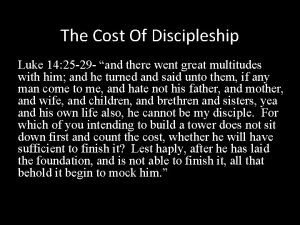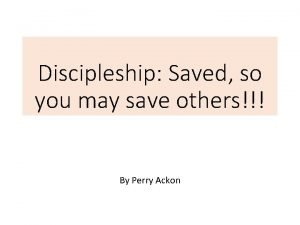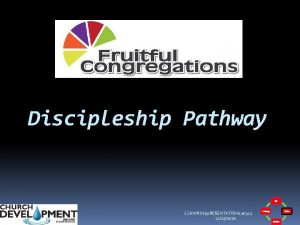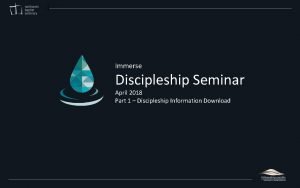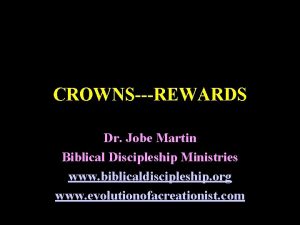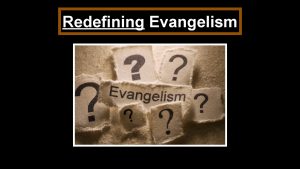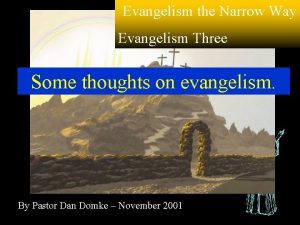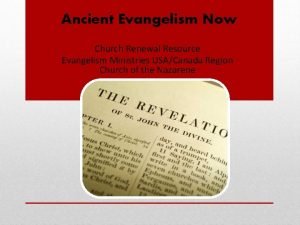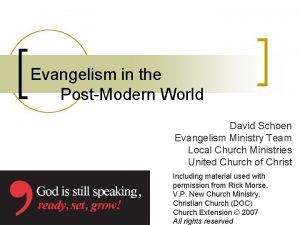Evangelism or Discipleship Evangelism or Discipleship The purpose






















- Slides: 22

Evangelism or Discipleship?

Evangelism or Discipleship? The purpose of this module is to: define and develop ministries aimed toward inviting, initiating, and instructing disciples. The objectives for this module are: • Distinguish between evangelizing and discipling; • Focus ministries on both processes— evangelizing and discipling; • Increase a congregation’s effectiveness in reaching and teaching ministries.

Evangelism or Discipleship? I. Evangelism may be defined in terms of programs. A. Evangelism is then described by the actions of believers who DESIRE to see the world saved. 1. “Here’s how we do evangelism. ” 2. Evangelism cannot, however, be adequately DEFINED by how a local congregation engages unsaved persons. 3. Sometimes evangelism is besmirched as “confrontational. ” a. No one likes, however, to be confronted or to confront. b. Evangelism is understandably abandoned—the casualty of fear.

Evangelism or Discipleship? B. At other times, evangelism is INCORRECTLY defined. 1. For example, when Christians say to unsaved people, “you ought” or “you should, ” they are not being evangelistic. 2. They are probably ACTING as a prophet announcing the will of God. 3. Evangelism, on the other hand, is identified by telling good news. 4. Evangelism INTENTIONALLY loves non-Christians with the purpose of inviting them into Christian discipleship in response to God’s initiative to forgive and to transform.

Evangelism or Discipleship? II. Discipling is a term that ATTRACTS a variety of usages and definitions. A. Some employ discipling as a catchall or a blanket term. 1. All the ministries of a local church CONSTITUTE discipling. 2. Discipling, in this sense, is equivalent to the word ministry.

Evangelism or Discipleship? B. Discipling also SUBSTITUTES for the word evangelism —a Christian who invites an unsaved person to accept Christ as savior is said to be discipling. C. Church people describe discipling as INTERACTING with pre-Christians before they make a decision to follow Jesus. D. Others would insist discipling is the DECISION of the unbeliever to serve God--when an unbeliever becomes a believer, a Christian has effectively discipled that person.

Evangelism or Discipleship? E. But in the minds of some Christians the follow-up process is called discipling. 1. Differences of opinion SURFACE as to length of time. 2. Follow-up can last for a few weeks (usually until certain Bible lessons are completed), months, a year, or 3 years (because Jesus took that length of time with His disciples).

Evangelism or Discipleship? F. Others maintain discipling (the follow-up process) is ACCOMPLISHED when certain milestones are reached. 1. Discipling is COMPLETED when a person joins the church. 2. When the new believer leads someone else to Christ, this signals “mission accomplished” for the discipler.

Evangelism or Discipleship? G. Still others argue, “Discipling lasts a lifetime. Christians must never stop growing. ” 1. In this case, discipling is synonymous with MATURING or sanctification. 2. These popular questions reflect this definition: “Who are you discipling and who’s discipling you? ” H. Training people in personal evangelism is thought to be discipling, too. 1. Matthew 28: 19 -20 gives support to this concept. 2. Teaching Christians how to EFFECTIVELY evangelize unbelievers constituted much of Jesus’ ministry to His disciples.

Evangelism or Discipleship? I. Developing people to be leaders in the church is also called discipling. 1. Pastors develop programs to ENHANCE the ability of the laity to administer and to coordinate various ministries of the local church. 2. Teaching leadership principles illustrate discipling as leadership development.

Evangelism or Discipleship? III. The ways the church uses the terms evangelizing and discipling hold the potential for confusion. • We are left UNSURE of what to do or how to proceed. • We long for people who need God to respond to Him. • And we want to become His ALLIES in the process. • How do we RESOLVE these tensions?

Evangelism or Discipleship? A. Since the Gospel of Matthew quotes Jesus, “Make disciples” (Matthew 28: 20), perhaps we can CONSULT its contents as to how we might do that. 1. The immediate scriptural context PROVIDES insight into disciple-making. 2. The church is to take the initiative by going. 3. Clearly discipling does not just happen; followers of Jesus are to go into the world to make disciples. 4. The church is also to TEACH so people who are not followers may know how to become followers. 5. Jesus told the church to BAPTIZE these new followers—to immerse them into the fellowship of believers.

Evangelism or Discipleship? B. The larger context of the book of Mathew gives additional insights into discipling—the way Jesus discipled the Twelve. 1. Jesus’ relationship with His disciples PRODUCED character. a. Christ’s method and message always CENTERED on people. b. He helped the Twelve understand themselves and what they were to do. c. He AFFIRMED positive character qualities in His followers. d. He called for them to change the way they thought and acted.

Evangelism or Discipleship? 2. Jesus taught kingdom-content to His disciples. a. His teaching and preaching REFERRED often to the Kingdom of God. b. He told stories ILLUSTRATING the role and rule of God. c. The Kingdom was to become a priority, “Seek first the kingdom. ” d. Explanation and APPLICATION took a majority of time in Jesus’ teaching. e. If His disciples were not asking questions, He was making INQUIRIES of them.

Evangelism or Discipleship? 3. Jesus taught His disciples through relational experiences. a. He made sure the Twelve were party to His encounters with unbelievers. b. Jesus EXPOSED the disciples both to the world and to ineffective religiosity. c. Jesus did not PROTECT His disciples from the cancerous church leaders of His day. d. In a worship event, a time of intimacy, Jesus informed His followers of His impending death. e. He PREPARED them for ensuing fall out. f. They reaffirmed their loyalty to Him.

Evangelism or Discipleship? 4. Jesus transferred leadership to His followers. a. Early in His ministry to the disciples He told them harvesters were few. b. With the first assignment Jesus gave, He PROVIDED power to achieve it. c. After their heady success, Jesus tempered their thinking—calling them from pride to humility. d. Jesus continued to DELEGATE responsibilities to these fledgling leaders. e. Jesus’ last words reminded them of the PURPOSE they were to accomplish—make disciples.

Evangelism or Discipleship? C. Before the discipleship process began we see Jesus evangelizing. 1. Jesus called disciples. a. When Jesus INVITED men to follow Him, He spoke an accompanying promise. “Come, follow me and I will send you out to fish for people” (Matt. 4: 19). b. He OFFERED another invitation with a promise, “Come to me, all you who are weary and burdened, and I will give you rest” (Matt. 11: 28).

Evangelism or Discipleship? 2. Jesus taught, healed and evangelized (Matt. 4: 23). a. Evangelism ACCOMPANIED other actions. b. Letting people in on God’s Good News was incomplete without a foundation in learning and the meeting of needs in healing. 3. Jesus LOVED the people who followed Him. a. He saw the crowds as harassed and helpless without a shepherd (Matthew 9: 35 -47). b. To these confused and leaderless people, He SPOKE Good News into their lives.

Evangelism or Discipleship? 4. Jesus made a specific effort to MINISTER to the poor. a. When RESPONDING to John the Baptist’s question about Jesus’ identity, Jesus cited His actions of healing and of raising people to new life. b. He then said, “. . . the good news is proclaimed to the poor” (Matt. 11: 5). 5. Jesus stood up for people. a. After Jesus called Matthew to follow Him, religious leaders, guests in Matthew’s home, QUESTIONED why Jesus ate with tax collectors. b. Jesus stood up for Matthew, saying, “I desire mercy, not sacrifice. For I have not come to call the righteous, but sinners” (Matt. 9: 12 -13).

Evangelism or Discipleship? D. Out of these activities, i. e. teaching, healing, ministry to the poor, showing mercy and standing for justice, Jesus announced good news. E. Evangelism affected unbelievers because holiness and love were first evident.

Small Group Exercise Discuss the following questions in your small group. 1. How does your congregation define evangelism? 2. How does your congregation define discipleship? (Hint: The programs of the local congregation will probably be based on an accepted definition of discipleship and of evangelism. ) 3. What would improve your congregation’s ministry of evangelism and discipleship?

Action Planning/Reporting 1. Meet with congregational leaders to re-teach this material. 2. Settle on definitions of evangelism and discipleship and agree to implement them. 3. Shape evangelism and discipleship ministries that will capture the imagination of your congregation and will effectively develop disciples. 4. Place these new or modified ministries on the calendar with the names of those leading those ministries.
 Discipleship evangelism
Discipleship evangelism Discipleship tools
Discipleship tools International institute of christian discipleship
International institute of christian discipleship Disciplers
Disciplers Call to discipleship songs
Call to discipleship songs Luke 14 cost of discipleship
Luke 14 cost of discipleship International institute of christian discipleship
International institute of christian discipleship What is discipleship
What is discipleship Sr lewis dot structure
Sr lewis dot structure Opening prayer for meeting
Opening prayer for meeting Saddleback discipleship pathway
Saddleback discipleship pathway International institute of christian discipleship
International institute of christian discipleship Osl line
Osl line Real life discipleship wheel
Real life discipleship wheel Dietrich bonhoeffer quotes on discipleship
Dietrich bonhoeffer quotes on discipleship Prayer about discipleship
Prayer about discipleship Jobe martin
Jobe martin Công thức tính độ biến thiên đông lượng
Công thức tính độ biến thiên đông lượng Phép trừ bù
Phép trừ bù Tỉ lệ cơ thể trẻ em
Tỉ lệ cơ thể trẻ em Thế nào là mạng điện lắp đặt kiểu nổi
Thế nào là mạng điện lắp đặt kiểu nổi Lời thề hippocrates
Lời thề hippocrates Vẽ hình chiếu đứng bằng cạnh của vật thể
Vẽ hình chiếu đứng bằng cạnh của vật thể





